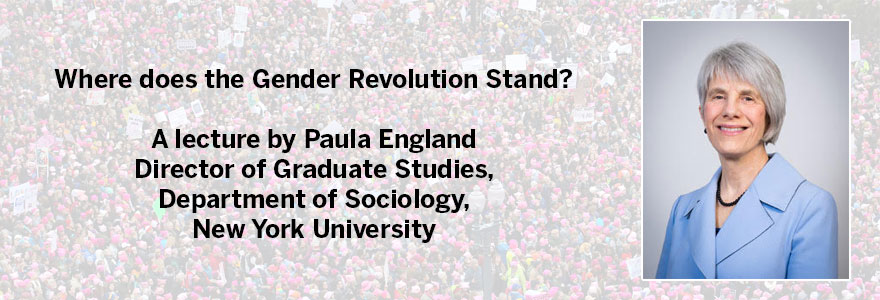News and Updates
Contact
Faculty of Social Science
Social Science Centre
Room 9438
Western University
T. 519-661-2053
F. 519-661-3868
E. social-science@uwo.ca
Where does the gender revolution stand?
October 03, 2018
Where does the gender revolution stand?
On October 22, Paula England, Professor of Sociology from New York University, will provide some insight into that question, as part of the Department of Sociology’s Balakrishnan Distinguished Lecture in Population Dynamics and Inequality.
Relying on US data from the last 50 years, England will investigate what the trends are in the gender gap in pay, women’s employment, and segregation in employment fields.
“On all indicators, pay and segregation, while there is continued progress, the speed of progress has slowed down from what it was in the 1970s and 80s,” said England.
There are still large gender gaps in employment rates, which jobs people are in, and pay, which England will explore in detail during the lecture.
The changes that have occurred have come through a change in women’s roles, for example whether they are employed and working in traditionally “male” jobs, much more than through a change in men’s roles, England said.
“Women have increased their employment much more than men have reduced theirs,” said England. “If it was really a two-sided thing, we would find that for every woman entering work force, a man dropped out, but has not really happened.”
Another big change has been the desegregation of certain occupations, which has occurred primarily through women moving into male dominated fields as opposed to men moving into female dominated fields.
England points out that for some population groups, there has been some improvement in relative status for women in the past decades because men’s employment rates or wages went down. Among less educated males, those with no more education than high school, for example, there has been a decline in employment and earnings.
Less educated men are less likely to be employed than more educated men, and we see the same thing for women.
“There is a real education gradient that goes the opposite way most people think,” said England. “Many people think women working most are working-class women, but they are actually employed less than well-educated women, even though the latter have richer husbands.”
England said subsidized child care centres would be one way to address this situation, and help improve employment rates for poorer women.
“Less educated women may be less employed, as they can’t really make enough to bring home much after they pay for childcare costs,” England said.
England will provide evidence that progress toward gender equality has stalled on many indicators. “It may be that we picked the low hanging fruit decades ago. Somethings were easy to change, and we got progress, but now what’s left is more difficult,” said England. “When starting from a huge gap, it may be that you can first get rid of the most obvious and blatant discrimination, but harder to get rid of more subtle discrimination.”
“It certainly makes clear that it’s not the case that once you start the gender revolution, finishing it is automatic,” said England, “because sometimes progress does stall out.”
England will present her lecture on Monday, October 22 at 3 pm in Conron Hall, University College 3110.
Paula England is Professor of Sociology, Silver Professor of Arts and Science, and Director of Graduate Studies, at New York University. England has received the Jessie Bernard Award for Distinguished Scholarship on Gender, a Distinguished Career Award from the American Sociological Association’s Family Section, and the 2015 Harriet Presser award for research on gender and demography from the Population Association of America. She was elected to the National Academy of Sciences in 2018.
Established in 2016, the goal of the Balakrishnan Distinguished Lecture in Population Dynamics and Inequality, to enhance the excellence in the Department of Sociology in Population Dynamics and Inequality and to give visibility for the University in this area in the academic world. The lecture series is made possible due to the support of Professor Emeritus T.R. Balakrishnan and Lois F. Leatham. The Balakrishnan Distinguished Lecture in Population Dynamics and Inequality is part of the Faculty of Social Science Distinguished Lecture Series.

